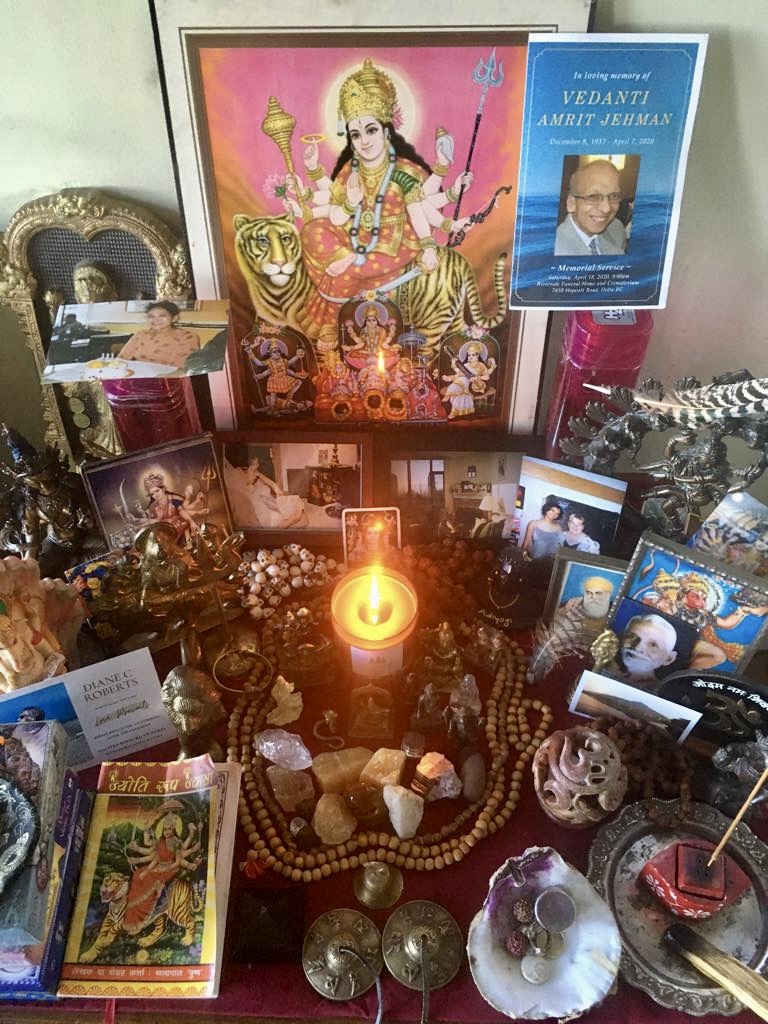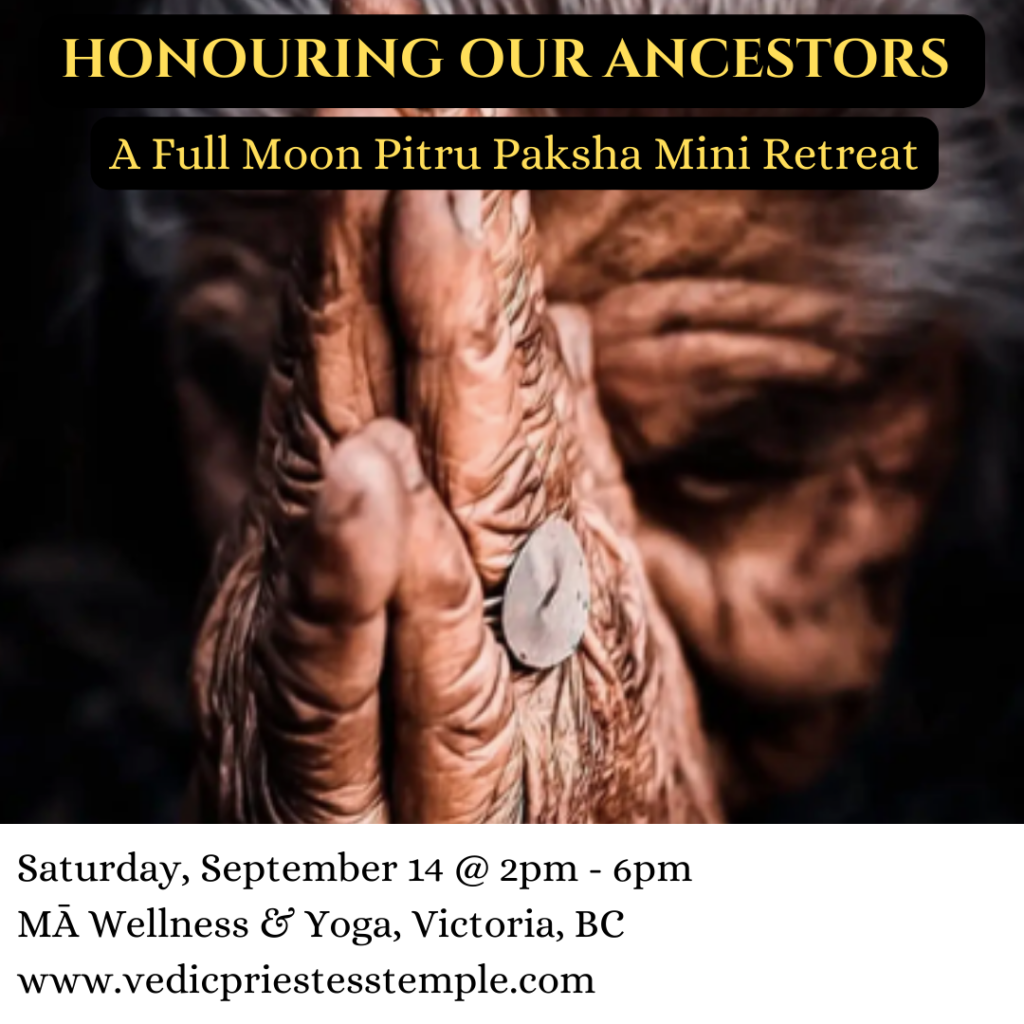Creating An Ancestral Altar
Folks around the world have been creating ancestral altars since time immemorial. In Mexico, people create an ofrenda (altar) to remember loved ones on Día de los Muertos, also known as Day of the Dead. In many African and Buddhist traditions, ancestral altars are tended to all year round, so folks can honour loved ones with a permanent space in the household. In India, we also honour loved ones who have passed by creating a sacred space to make offerings and stay connected. This could be a permanent space or temporary ritual-inspired altar, or as simple as a picture on the wall with offerings like a mala of flowers or beads around the deceased loved one’s neck, and/or tilak (sacred anointment) on their third eye.
Ancestral altars can be for everyone. You don’t have to be religious or spiritual. Absolutely anyone can create an altar and ritual to honour their ancestors. The intention is to house our ancestral energies.
Creating an altar dedicated to your ancestors is a powerful way to honour and connect with your ancestors. It is a sacred space to commune with them – to nurture a line between you and them, that is. To send and receive blessings, and bring peace and healing to the lines. It’s a space we can send prayers, share what we are needing support with, clear old traumas, and let go of old ways of being that have been rampant in the lineage, and no longer serve us, nor those who come after us. Altars are a sacred place that can help remind us that we are not alone in the world – we have support available – we just need to tap into it.
Your ancestors can be like deities on your altar too. You can pray to them, make offerings to them, and turn to them for guidance. And you can express gratitude to them and the path they have paved for you. You can ask for protection at particularly tumultuous times in your life, or for a blessing for your overall life journey.
Ancestral altars also provide protection in your living space and for those who inhabit it, because you are sharing your home with your ancestors through the creation and tending of an ancestral altar. It also gives you regular access to the wisdom and knowledge of your lineage.
This is a dedicated sacred space based on love and respect for those who came before us and paved the way for our existence.
Although it is traditional to connect with your ancestors during autumn time in many cultures around the world – we can have our ancestor altar set up all year round to invite in the spirit of our loved ones to stay connected.

(Image: My ancestral altar)
How to begin?
Choose an intentional space in your home
Find a space in your home that you would like to dedicate to your ancestors. This could be in the living room, bedroom, or a space in your home that is dedicated to practice. Northeast is an auspicious location to form an altar in the home according to Vedic/Yogic tradition.
Flat surface
Then find a flat surface to place special items on. For example, this could be a side table, shelf, top of a dresser, inside a closet or cupboard, or on the nightstand. My altar is on a low table in the centre of my living room. It is the heart of my living space.
Cleanse the space
It’s important to cleanse this space initially before first setting up your altar, and then regularly after that. This can be done with smudging, diffusing essential oils, and/or simply dusting. Cleansing the space regularly is important so that the energy doesn’t get stagnant.
Cleaning the altar and keeping the space tidy and free from clutter is a form of daily devotion and honoring.
Cloth
You may include an altar cloth in a colour that is meanful to your ancestors. For example, red, orange and yellow are powerful colours in the yogic/Vedic lineage, so my ancestral altar cloth is red – the colour that represents shakti (creative power).
Place special and sacred objects on your altar that represent your ancestors and lineage
This can include images of your ancestors, items and sacred objects that represent them, and any other items that remind you of your ancestors and feel appropriate. You can even add some of their belongings, or a mug of their favourite beverage.
Some items on my ancestral altar include photos of my ancestors, the murtis of deities of my lineage, gemstones specifically for healing, the traditional five to six offerings of Yogic/Vedic tradition – an incense holder for incense, a sacred bell, a ghee lamp holder for fuelling and lighting, sometimes a vase for flowers, and a vessel for sweets and water). My mother’s fancy watch that my father gave me when she passed away is also on my altar, plus the malas of my parents from our ancestral lineage altar, shells and stones from the oceans of my ancestral land, as well as feathers from special birds in India, etc.
You may not have access to photos and other heirlooms. If this is the case, perhaps you may want to consider artwork that represents your family lineage. A painting of the old family homestead, a piece of jewelry or a flower that represents an ancestral country. Did your ancestors inhabit a place that has a national flower? Maybe a musical instrument or beading/weaving/carving that represents an ancestor’s country of origin?
Consider thinking outside the box, and adorn your altar space in a way that your ancestors will recognize and welcome. A sacred space that is deeply personal and unique to you and your lineage.
By welcoming them through giving them a space of their own in your home, it opens up the sacred lines for them to bless you with abundance, wisdom, guidance, and protection.
Make Offerings & Ritual
At your altar, you can make offerings that are meaningful to you and your ancestors. This opens the lines of connection. Offerings I make regularly include the sound of our lineage’s sacred brass bell, lighting a ghee lamp or candle, sandalwood incense, flowers or a sweet, and water in the eight cardinal directions.
There is a ritual in lighting and tending to the flame daily – and in lighting incense to cleanse the space and connect with the spirits of your ancestors. A specific scent may bring you closer to one of your ancestors.
Light your altar and make your offerings. Express your gratitudes. Then pray and/or make asks. Then meditate with an intention of being open to receiving. Remember to be specific with who you want to speak to.
Other ritual can include:
- Writing a letter to your ancestors.
- Letting go ritual – write it down and then burn it.
- Letting go ritual – speak it and then offer it to the earth through an earth form or a body of water – whatever is appropriate. Perhaps you want to submerge in a natural body of water afterwards.
- Wish your ancestors a happy birthday/Father’s Day, Mother’s Day/connect on their death anniversary, etc.
- Play their favourite music, mantra, or sacred songs in their honour.
- Prepare a home-cooked dish they loved.
- Craft something based on your skillset and interest.
- Say a prayer in their honour.
Click here for other ideas on how you can connect with and honour your ancestors.
Connect with the altar regularly
It’s important to make offerings regularly. Consider getting into the habit of speaking/connecting to your ancestors daily, even if you’re not doing a full-on ritual or meditation. Or weekly if that feels more manageable. You can choose a day and time that you come to the altar each week, to guide your ancestral practice.
Keep the altar clean and tidy
Tending to your altar can be a form of daily ritual. Remember to tidy it up/clean/dust weekly to keep the energy fresh and flowing.
Consider communing with your ancestors so they can support you on your path, and you can support them by bringing peace and healing to your lines through steady practice and devotion. Enjoy making your ancestral altar your own and let it inspire you.
May creating an ancestral altar in your living space bring you peace, protection – and bring you closer to your ancestors.
Your ancestors will surely respond to you taking the time to get to know them and inviting them into your life. They are ready to speak with you. All you have to do is create the space and take the time to connect and listen.
Saturday, September 14, 2:00 – 6:00pm
MĀ Wellness & Yoga (Earth Studio), Victoria, BC
Join Satya for “fortnight to the ancestors” known as Pitru Paksha in her ancestral land of India. It is the 16-day lunar period (from full moon to new moon) in the Vedic/Yogic tradition, when we pay homage to our ancestors by making offerings and prayers in ceremony. We will gather around our co-creative ancestral altar to bring peace and healing to our lines, as well as create an opening to receive blessings from our ancestors.
We express our heartfelt gratitude to all the previous generations of those who have contributed to our life – to who and what we are today.
We would not be where we are today without our ancestors. It’s time to give back. The power of this work is in simply showing up for it, trusting the ritual journey, and being open to receiving.
We will utilize this auspicious time to not only help heal our lineages, but also to honour and express gratitude for the blessings our revered ancestors have gifted us. For those who feel disconnected from their ancestors or don’t know much about them, this is an opportunity to begin forming a connection. It’s a powerful time to listen carefully for wisdom and guidance from the spirit world.
Participants will create a simple and personalized ancestral altar – which will serve as parts of a larger, co-creative sacred ancestral mandala. We will chant ancestral mantras, make offerings and prayers, hear stories, and engage in reflective writing and sharing – all while communing with the elements, the Divine, and our ancestors. Folks will leave with a practice to carry forward during this deeply auspicious 16-day ancestral lunar period.

